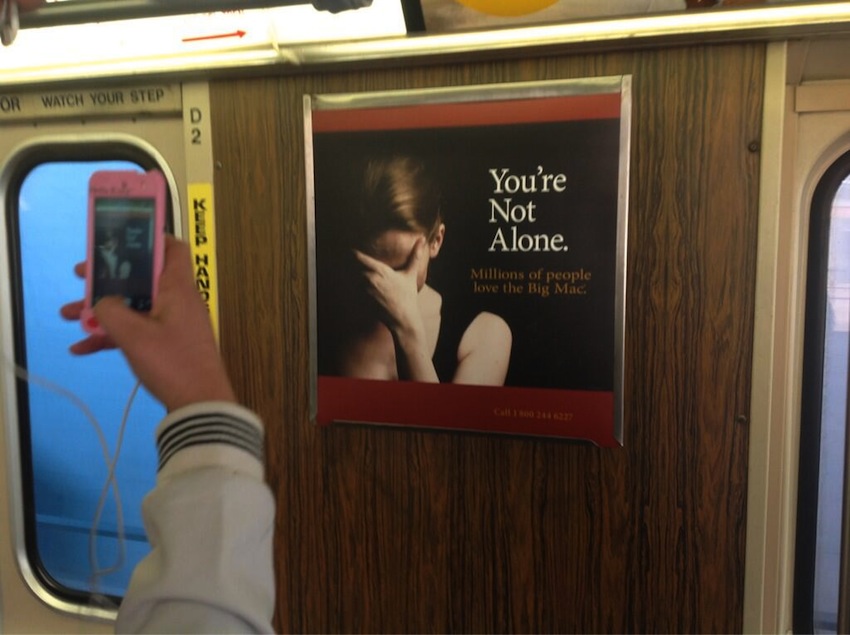Suffering from a Big Mac Addiction? A New McDonald’s Ad Can Help*
Update April 9, 2013 Part II: McDonald’s sent a statement saying they were not previously aware of the ad campaign and did not approve it. “As soon as we learned about it, we asked that it be taken down immediately,” says Nicole DiNoia, a regional spokesperson. We’re working on tracking down just who did fund an entire McDonald’s ad campaign, if not McDonald’s, and we’ll update with answers.
Update April 9, 2013: A McDonald’s spokesperson says the company is currently investigating whether the company is responsible for the ads. A commenter provides useful context, noting that the ad attracting controversy is just one of several on the T car advertising McDonald’s products that parody a range of ads you’d typically see on the T. There’s one imitating personal injury lawyer ads, adult education ads, etc.
Original: A passingly clever if strategically questionable new ad for the Big Mac on the MBTA is attracting notice, maybe not for the reasons the comedians in the McDonald’s ad department hoped. Observe this sign, spotted by several people on the Orange Line this weekend:
We’ve put in a call to McDonald’s to confirm that this, in fact, their advertisement and we’ll update with their comment. But in the meantime, this strikes us as a fairly successful use of the old bait-and-switch hook on which much comedy is hung. The despairing woman and the “You’re Not Alone” headline instantly recall any number of ads for mental health hotlines or clinical research studies seen often by anyone who rides the T regularly. But read on and you discover that it’s an ad for McDonald’s. “Millions of people love the Big Mac,” the ad reads, following up with an 800 number that is, in fact, the line for McDonald’s.
Some people aren’t laughing. Suffolk Law Professor David Yamata, posts on the blog for Suffolk’s New Workplace Institute that the ad is “just too close to the real thing to be funny” in an age where people struggling with mental health could often genuinely use the support offered by ads for actual depression services.
Aside from being potentially insensitive, the ad may be “too close to the real thing” in another way, one that’s actually harmful to McDonald’s own business purposes. After all, the junk food and fast food industry are withstanding particularly acute scrutiny these days as new research claims that the addictive properties in fat, salt, and sugar have been consciously exploited by the food industry for years. A February cover story on the packaged junk food industry in the New York Times Magazine tells this story at length. Reporter Michael Moss summarizes his findings, writing:
The public and the food companies have known for decades now … that sugary, salty, fatty foods are not good for us in the quantities that we consume them. So why are the diabetes and obesity and hypertension numbers still spiraling out of control? It’s not just a matter of poor willpower on the part of the consumer and a give-the-people-what-they-want attitude on the part of the food manufacturers. What I found, over four years of research and reporting, was a conscious effort — taking place in labs and marketing meetings and grocery-store aisles — to get people hooked on foods that are convenient and inexpensive.
McDonald’s would probably counter that they offer consumers a range of healthy options in addition to their standard fare, and that they leave it to the consumer to make appropriate choices. But … the Big Mac is definitely not one of those healthy options. You’d think, given the research showing mental and physical health problems that come with poor nutrition, McDonald’s might want to shy away from showing a woman despairing over her love for the Big Mac. Doesn’t that just give McDonald’s critics a huge opening? Alas, it seems like the allure of a quick laugh was just too great for advertisers to consider the deeper implications once the ad is considered for more than a few seconds.



